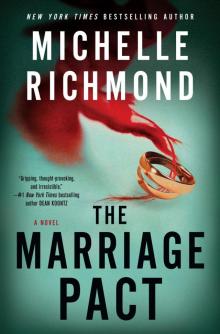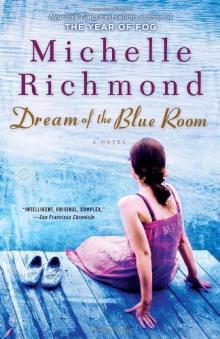- Home
- Michelle Richmond
The Marriage Pact Page 6
The Marriage Pact Read online
Page 6
Even though I’m still not entirely sure what we’ve gotten ourselves into, I’m happy that Alice is embracing The Pact. I understand that her acceptance of The Pact is proof that she is also embracing our marriage.
In the days that follow, I want to show her that I too am willing to accept The Pact and, more important, am equally committed to making our marriage work. So I dive more deeply into The Manual. Section 3.8 is entitled Travel.
While home is the sanctuary of a good marriage, travel is also essential. Travel allows a relationship the sun and space to grow in a more conducive environment. Travel allows partners to grow together through shared experiences. Travel allows spouses to reveal different sides of themselves outside of the context of everyday life. Travel can be rejuvenating for individuals, and shared travel can be rejuvenating for a marriage.
3.8a: Each member must plan one joint trip each quarter. Trip should be defined as travel away from home for a period of no less than thirty-six hours. Members should not be accompanied by individuals, friends, family, or other associates. While most travel should include only spouses, travel with other members of The Pact is acceptable and even encouraged. Travel need not be expensive, distant, or prolonged.
3.8b(1): Penalty: Failure of a member to plan at least one trip during a nine-month period should be considered a Class 2 Misdemeanor. Failure to plan at least one trip during a twelve-month period should be considered a Class 5 Felony.
I can’t help chuckling at the language. A misdemeanor? The Pact seems to make it awfully easy to get in trouble. Nonetheless, I can see how honoring the travel rule would make for more excitement in the marriage, so I set about planning my first trip under the definitions of The Pact.
Four nights after receiving the spatula, while Alice is getting ready for bed, I sneak into the kitchen and place an envelope with her name on the table. The envelope contains the details of the trip I’ve planned—a weekend at Twain Harte in the Sierra Nevadas. The cabin I’ve rented doesn’t have an address, just a name, the Mountain Ruby. Stapled to the rental agreement is a photo of the view from Mountain Ruby’s front window: miles of blue lake stretching toward the snowy mountain peaks.
16
Alice and I are both busy with work and Christmas shopping. December 14 comes sooner than expected.
Alice has been caught up in another new case; a reclusive writer hired her firm to file suit against a television studio, claiming that the studio stole three of his short stories for their new series. Because the man has a limited budget, Alice was made the lead on the account. She’s been putting in a lot of extra hours, working late nights and early mornings; however the case turns out, it will have her name written all over it.
I leave work early and head over to the School of the Arts. A former patient, an eighteen-year-old I treated during his first two years of high school, invited me to a matinee production of A Christmas Carol in which my patient plays the lead. He’s a sweet kid with some socialization issues. He put a lot of work into the production, and I’ve been excited to see it.
Alice and I haven’t even discussed the Hillsborough party scheduled for tonight. When Vivian called, I immediately put it on our shared iCloud calendar, but then I forgot to follow up. Alice and I used to talk for hours, but since her work has ramped up, our opportunities for conversation have dwindled. My workday doesn’t start until nine in the morning, and I have a hard time forcing myself to get up at five to see her off. Most nights, she comes home after eleven, holding takeout from a mediocre Chinese place around the corner. I’m embarrassed to admit we’ve gotten into the habit of eating our late-night dinner in front of the television.
We’ve been watching the show that forms the basis of Alice’s case with the writer Jiri Kajanë. The stories in contention were part of his collection Some Pleasant Daydream. The television show is a series about a couple of male friends, one old, one young, who live in a small town in an unnamed country. The show is called Sloganeering, which also happens to be the title of one of the stories in her client’s book. It’s a pay cable sort of thing, too quirky for network television but just weird enough to have amassed a surprisingly large and devoted audience over its five-season run. In the legal discovery process, Alice’s firm received DVDs of the entire run of the show, so each night we watch an episode or two.
Maybe it sounds like we’re in a rut, but it’s not like that at all. We enjoy the show, and it’s the perfect way to relax at the end of mentally taxing days. Besides, it feels soothingly domestic. If marriage begins as a wheelbarrow of wet cement, unformed and with endless possibilities for what shape it will eventually take, the nightly routine of takeout and Sloganeering is giving our marriage a chance to harden and set.
During the play’s intermission, I text Alice to make sure she has seen the Hillsborough party on the calendar.
Just noticed it, she texts back. What the hell?
We should go. Could be interesting. Can you make it?
Yes, but what does one wear to a cult meeting?
Robes?
Mine are at the cleaners.
Gotta go. Deposition in 5.
Let’s leave by 6:15.
ok. XOXO.
A journal article I read recently cited research indicating that couples who text each other throughout the day have much more active sex lives and report higher satisfaction with their spouses. I’ve taken the research to heart, and I never let a day go by without picking up my phone to send my wife a message, however small.
17
Hillsborough was founded in the 1890s by railroad and banking barons who wanted to escape the riffraff invading San Francisco. The city consists of a maze of narrow, twisty roads, working their way through the canyons like origami. Hillsborough has few sidewalks, no businesses, just large houses set behind ivy-laden walls. If not for the vigilant and neighborly police force, which has a reputation for always being willing to show interlopers the way out of town, one could get lost in its maze for days, eventually running out of gas and being forced to survive on a diet of caviar scraps and organic truffled lamb shanks from the compost bins perched outside the imposing walls.
We get to the freeway exit at seven-fifteen. After arriving home late from work, Alice hastily tried on seven different outfits before we could get out the door. I’m twitchy and anxious as we take the exit, punching the GPS, which says NO SIGNAL AVAILABLE.
“Relax,” Alice says. “What kind of party starts exactly on time?”
A 1971 Jaguar XKE flies past. The car is beautiful, British racing green, hardtop, rounded in back. My partner Ian has told me it’s his dream car. I drive quickly, hoping to catch up. “Snap a picture for Ian,” I tell Alice. But before she can find the camera icon on her phone, the Jaguar turns up a long driveway and disappears.
“Four Green Hill Court.” Alice points to the mailbox where the Jaguar just turned in.
I slow to a crawl, pausing to look at her. “Are we sure we want to do this?”
—
The house at 4 Green Hill Court has a name: Villa Carina. The title is engraved on a stone plaque attached to the wrought-iron gate. Originally, Hillsborough consisted of nine estates—complete with guest homes and stables and servants’ quarters—set amid hundreds of acres of gardens and trees. From the looks of it, this used to be the main entrance to one of those estates.
The long brick driveway is lined by manicured trees. Eventually, we come upon a broad area paved in stone, where a row of cars is dwarfed by a sprawling, four-story mansion. Alice counts fourteen cars, mostly Teslas. There’s also an old Maserati, a restored 2CV, a blue Bentley, an orange Avanti, and the Jaguar.
“Look,” Alice says, pointing reassuringly at a black Audi—perhaps Vivian’s—and a dark gray Lexus sedan, “cars of the people, almost. And we thought we’d be out of place.”
“Maybe we can still back out,” I say, not entirely kidding.
“Forget it. This whole place is probably rigged with cameras. I’m sure we’re a
lready on video somewhere.” I park at the far end, putting my Jeep Cherokee beside a Mini Countryman.
Alice opens the passenger mirror to check her lipstick and dab on some powder, while I check my tie in the rearview.
I step out of the car and go over to Alice’s side to open her door. She unfolds herself from the car, stands, and takes my arm. Up ahead, lights shine down from the upper floors. Walking toward the door, past the cars, I catch a glimpse of the two of us reflected in the window of the Jaguar. Me in my Ted Baker suit and new tie, Alice in the deep red dress she purchased for our honeymoon. “Mature Sexy,” she calls it. Her hair is pulled back in a serious but nice way.
“When did we grow up?” I whisper.
“We should have taken a picture,” she says, “in case it’s all downhill from here.”
Whenever I feel old—which seems to be happening more and more often these days—Alice tells me to imagine taking a picture of myself, then to imagine myself twenty years in the future looking at that picture, thinking how young I looked, hoping that I had enjoyed or at least recognized my youth. That usually does the trick.
As we approach the house, I hear voices. When we round the hedge, there is Vivian at the bottom of the steps, waiting.
She never told me what to wear or what to bring, and it only occurs to me now that it was probably another test. I’m suddenly glad I went out of my way this afternoon to get a nice bottle of wine for the host. Vivian is wearing another bright dress, this one fuchsia. She has a drink in one hand, something clear on the rocks, and a bouquet of yellow tulips in her other hand.
“Friends,” she says, embracing us without spilling a drop. She hands the tulips to Alice and takes a step back to look at her. “The yellow tulips are a tradition, though I can’t say I know when or why it started. Come. I can’t wait to introduce you both to the group.”
As we climb the stone steps, Alice gives me a look as if to say, Too late to turn back.
The massive doors give way to a gigantic foyer. It isn’t what I expected, though—no marble, no fussy French furniture, no painting of a long-dead railroad baron above a fireplace. Instead, it has natural wood floors, a brushed steel table topped with a concrete bowl of succulents, and lots of open space. Beyond the foyer is a huge room outfitted with floor-to-ceiling windows. The windows frame a group of people out on the patio.
“Everyone is excited to meet you,” Vivian says, leading us through the living room. In the mirror above the fireplace, I catch a glimpse of Alice’s face. It’s difficult to read her expression. I like seeing her holding the yellow tulips, which make her look soft. Since taking the job at the law firm, she has developed sharper edges; the late nights and the intensity of the work have understandably made her a tad impatient.
An attractive woman in her fifties hurries toward a door to our left, carrying an empty tray. She seems frazzled, though underneath the nervous energy she has the bearing of a woman with wealth and influence.
“Ah,” Vivian says, “perfect timing. Let me introduce our host, Kate. Kate, this is Alice and Jake.”
“Of course it is,” Kate says, nudging the door open with her shoulder to reveal an enormous kitchen. She sets the tray on the counter, then turns back to us. I reach out to shake her hand, but she pulls me in for a long hug. “Friend,” she says, “welcome.” Up close, she has the faint smell of almond paste. I notice a scar on the left side of her chin. Though she’s covered it with makeup, you can tell it was a significant cut. I wonder how she got it. “My dear friend,” she says, embracing Alice, “you’re exactly as Vivian described.”
She turns to Vivian. “Why don’t you take them outside and introduce them to the group? I’ve got work to do. It’s been a long time since I hosted a party for thirty-six without help.”
“The rules require that no one other than members can be present during the quarterly party,” Vivian explains as the kitchen door swings shut behind Kate. “No caterers, no servers, no chefs, no cleaners. For security, of course. Pay attention; your turn will come.”
Alice raises her eyebrows at me, excited. I can tell she’s already planning the party in her mind.
The backyard is massive. A bright blue rectangular pool, a fire pit, a lush lawn bordered by elms—it looks like a photograph for a luxury home-and-garden magazine. Tasteful tiki torches give the area a warm glow, and in the faint light I can see the guests scattered about in clusters.
Vivian hands us two glasses of champagne and leads us to the center of the patio. “Friends!” she calls out, clapping her hands twice. Everyone stops talking and turns to look. Though I’m not exactly shy, I don’t enjoy a stage, and I feel my face turning red. “Friends, I am honored to introduce Alice and Jake.”
A man in a blue sport coat and dark jeans takes a step forward. Suddenly noticing that most of the men are similarly dressed—more Silicon Valley entrepreneur, less Wall Street financier—I wish I hadn’t worn the suit. He raises his glass. “To new friends,” he says. “To new friends,” the group choruses, and we all drink. After nods and smiles directed at Alice and me, the others return to their conversations and the man walks over to introduce himself.
“Roger,” he says. “I’m so pleased to host your introduction at my home.”
“Thank you for having us,” Alice says.
Vivian takes me by the arm. “Let’s leave these two to talk. There are people you need to meet.”
It’s a better crowd than I expected—relaxed, happy, no obvious arrogance or pretension. Two venture capitalists, a neurologist and her dentist wife, a former professional tennis player, several tech people, a local news anchor, a clothing designer, a couple in advertising, and Vivian’s husband, Jeremy, a magazine publisher.
We approach the last group. As Vivian begins making introductions, I realize that one of the women is someone I used to know. JoAnne Webb—now JoAnne Charles, according to Vivian. We went to college together. More than that, we were in the same class, we lived in adjoining dorms our sophomore year, and we were both floor resident advisers. Each Tuesday for the entire year, I saw her at our weekly RA meeting in the Fireside Lounge.
While I haven’t seen JoAnne in years, I’ve actually thought about her many times. It was JoAnne who influenced me to become a therapist. In the middle of our sophomore year, on a warm weeknight, I was eating dinner in the cafeteria when a kid from my floor came running up, looking pale and scared. “There’s a jumper on Sproul,” he whispered. “They need you.” I ran out of the cafeteria, across the street, and up onto the roof of the neighboring dorm. Perched at the edge, I could see a kid I only vaguely recognized. His legs were dangling over the side, seven stories up. JoAnne Webb was the only other person there. I could hear her soft voice, talking slowly as she moved in closer. The kid seemed irritated, ready to jump at any moment. From the phone inside the stairwell, I contacted the campus police.
I stepped closer to where JoAnne had taken a seat next to the kid, her legs also dangling off of the roof. She made a subtle gesture with her hand, asking for time and privacy. As the kid’s voice grew more agitated, JoAnne’s became softer and quieter. The boy had a long list of things that were bothering him—grades, money, his parents, the usual, although it mainly sounded like a short, failed relationship was what led him to this moment on the edge. Two others had jumped from the very same roof earlier that semester; from the sound of the kid’s voice, I sensed he would soon be number three.
For nearly two hours, JoAnne sat there with him as a crowd of students, campus police, and a fire truck gathered down below. Every time someone came onto the roof and approached them, JoAnne would raise her hand as if to say, “Give me time.” At one point, she motioned me over. “Jake” she said, “I’ve got a sore throat, can you grab me a Dr Pepper from the vending machine?” And then she turned to the kid. “John,” she said, “a Dr Pepper for you too?”
The kid seemed caught off guard. He paused, stared at her, and finally said, “Yeah, that sounds real good.”
I can’t explain why, but I instantly knew that in those ten seconds, in that simple offer of a Dr Pepper, JoAnne had somehow talked the boy out of killing himself. I was pretty good at my job, at working with people, but in that moment I realized I was years away from understanding people the way JoAnne understood that kid. A few months later, I switched my major to behavioral psychology. Ever since then, whenever I see a can of Dr Pepper in a vending machine, I always hear JoAnne say, “A Dr Pepper for you too?”
In college, JoAnne was plain, her long hair streaked with shades of gold and brown. Standing across from me now, lit by the torches, she looks different. Every hair on her head seems to be following the strict orders of some stern, dictatorial hairstylist from a fancy salon in Union Square. It isn’t that her look is bad. It’s just surprising. When did she learn about makeup?
“It’s good to see you, Jake,” JoAnne says.
“So you two know each other.” There’s a false cheerfulness in Vivian’s voice. “How perfectly random. I’m surprised I wasn’t told.”
“We worked together in college,” JoAnne explains. “A hundred years ago.”
“Ah,” Vivian says. “Outside the range of our current background policy.”
Then JoAnne gives me a long hug, whispering in my ear, “Hello, old friend.”
A man walks up—tan, wiry, average height, wearing a very expensive suit. “I’m Neil,” he says, gripping my hand too tightly. “JoAnne’s husband.”
“I hope JoAnne doesn’t mind me saying this,” I say, “but I watched her save a boy’s life one night.”
Neil rocks back on his heels. He looks from me to JoAnne. I’ve seen that look before. He’s appraising me, appraising his wife’s reaction to me, deciding if I’m a threat. “She’s a woman of many talents,” he says.
“Oh,” JoAnne protests quietly, “it wasn’t like that at all.”

 The Wonder Test
The Wonder Test The Year of Fog
The Year of Fog The Marriage Pact
The Marriage Pact Golden State
Golden State Dream of the Blue Room
Dream of the Blue Room No One You Know
No One You Know